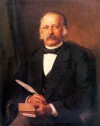Theodor Fontane

Theodor Fontane (German: [ˈtʰeːodoɐ̯ fɔnˈtaːnə]; 30 December 1819 – 20 September 1898) was a German novelist and poet, regarded by many as the most important 19th-century German-language realist writer.Fontane was born in Neuruppin into a Huguenot family. At the age of sixteen he was apprenticed to an apothecary, his father's profession. He became an apothecary himself, and in 1839, at the age of 20, wrote his first work (Heinrichs IV. erste Liebe, now lost). His further education was in Leipzig where he came into contact with the progressives of the Vormärz. Fontane's first published work, the novella Geschwisterliebe ("Sibling Love"), appeared in the Berlin Figaro in December 1839.
His biographer Gordon A. Craig observes that this work gave few indications of his promise as a gifted writer: "Although the theme of incest, which was to occupy Fontane on later occasions, is touched upon here, the mawkishness of the tale... is equaled by the lameness of its plot and the inertness of the style in which it is told, and [the characters] Clärchen and her brother are both so colorless that no one could have guessed that their creator had a future as a writer."
His first job as apothecary was in Dresden after which he returned to his father's shop in the provincial town of Letschin in the Oderbruch region. Fleeing its provincial atmosphere, Fontane published articles in the Leipzig newspaper Die Eisenbahn and translated Shakespeare. In 1843, he joined a literary club in Berlin called Tunnel über der Spree (Tunnel over the river Spree) where he came into contact with many of the most renowned German writers including Theodor Storm, Joseph von Eichendorff and Gottfried Keller.At the age of 57 Fontane finally worked in the genre for which he is remembered, the novel. His fine historical romance Vor dem Sturm (1878) was followed by a series of novels of modern life, notably L'Adultera (1882), a book about adultery which was considered so risqué that it took Fontane two years to find a publisher.
In his novels Frau Jenny Treibel; Irrungen, Wirrungen; and Effi Briest (1894), he found his very own tone, yielding insights into the lives of the nobility as well as the "common man". His achievement there was later described as poetic realism. In Der Stechlin (1899), his last completed novel, Fontane adapted the realistic methods and social criticism of contemporary French fiction to the conditions of Prussian life.
 čeština
čeština Deutsch
Deutsch français
français magyar
magyar polski
polski русский
русский English
English Azərbaycan
Azərbaycan italiano
italiano ქართული
ქართული қазақ
қазақ Nederlands
Nederlands português
português slovenčina
slovenčina español
español 中文
中文 беларуская
беларуская







